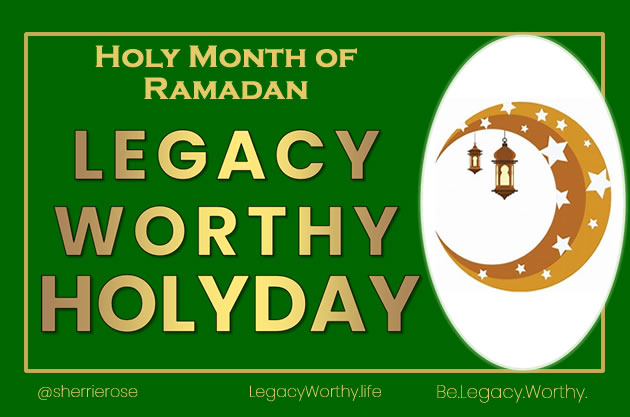Legacy Worthy Holy Day: The end of Ramadan Eid-al-Fitr

Legacy Worthy Holy Day: The end of Ramadan Eid al-Fitr, Islamic holy month of fasting
Eid al-Fitr, a Muslim holiday celebrated around the world to mark the end of the month-long fast.
Eid Al-Fitr is a day that signifies the end of the Islamic Holy Month Of Fasting
Ramadan Eid al-Fitr is the Islamic holy month of fasting, and an important part of the religious calendar. It’s a spiritual journey for Muslims around the globe, where they practice self-discipline, prayer and devotion to Allah. Every year, hundreds of millions come together in celebration at the end of this month-long period of fasting. Whether you’re a Muslim or not, this festival is sure to leave you with a feeling of awe and appreciation for the beauty that lies in cultural diversity. In this article, we’ll discuss what happens at the end of Ramadan Eid al-Fitr and how it’s celebrated around the world.
After 30 days of abstaining from food and drink from sunrise to sunset, Muslims come together on Eid al-Fitr (the Festival of Breaking Fast). This day marks the end of Ramadan – a time dedicated to prayer and reflection – and signifies new beginnings for them. On this day, family and friends come together to share gifts and meals as a way to show their shared love for one another. There are also special events held in mosques around the world including prayers, sermons and readings from Islamic texts.
While each country celebrates Eid al-Fitr differently, there are some common themes like giving charity (zakat) to those who are less fortunate in society; offering special prayers; dressing up in traditional or festive clothing; exchanging gifts; sharing meals with family; participating in community activities such as parades or sports competitions; lighting fireworks; listening to music; visiting friends and relatives; donating food items like milk or dates to those who need them most; and hosting feasts with delicious foods such as biryani or samosas. All these customs bring people closer together while they celebrate their faith.
#1 Definition Of Ramadan
Ramadan is an Islamic holy month of fasting that occurs annually. It’s a time for spiritual reflection and devotion to Allah, the Arabic term for God. During Ramadan, Muslims abstain from eating, drinking, smoking and engaging in sexual activities from dawn until sunset. People who are ill, pregnant or travelling are exempt from fasting but should make up any days they missed later in the year. See more about Ramadan here
Ramadan is one of the five pillars of Islam, which include belief in Allah, prayer five times a day, giving charity and performing the pilgrimage to Mecca at least once in a lifetime if possible. During Ramadan, Muslims come together as a community to fast and pray. They often gather with family and friends to break their fast after sunset with dates and water or special dishes prepared just for this occasion.
At the end of Ramadan comes Eid al-Fitr, which marks the end of fasting and is celebrated with traditional food such as dates and sweets as well as prayers in mosques and special gatherings with family members. It’s an occasion full of joyous celebration that marks the start of a new month on the Islamic calendar.
#2 History Of The Festival
Ramadan has been celebrated as an Islamic festival since the time of the Prophet Muhammad in the 7th century. This is also known as Eid al-Fitr, which marks the end of Ramadan and is a time of celebration and feasting. The origins of this festival can be traced back to pre-Islamic Arabia, when it was celebrated in honor of a particular deity or spirit. Over time, the focus shifted to include fasting and prayer during Ramadan.
The exact date of Eid al-Fitr changes annually due to the lunar calendar, but it typically occurs on either the last day of Ramadan or shortly after. During this time, Muslims around the world exchange gifts and prayers with family and friends. Many also take part in charitable acts such as donating food or money to those in need.
In some countries, Eid al-Fitr is marked by large festivities that involve dancing and singing, while others may hold more traditional gatherings centered around prayer and reflection. Regardless of how it is observed, Eid al-Fitr serves as an important reminder for Muslims to reconnect with their faith and celebrate Allah’s mercy and blessings.
#3 Traditions And Celebrations
Eid al-Fitr marks the end of Ramadan and celebrates the breaking of a month-long fast. It is a joyous occasion, celebrated with family and friends by Muslims around the world. The traditions are rooted in Islamic teachings, but also vary from region to region.
On Eid al-Fitr morning, Muslims perform special prayer services at their local mosque or home. Many give charity to those who are less fortunate and exchange gifts with loved ones. Afterward, there are often large celebrations with music, dancing and traditional meals.
Food is an important part of Eid al-Fitr celebrations. Dishes such as biryani and kheer (a type of rice pudding) are popular in South Asian countries while sambusas are enjoyed in Somalia and Ethiopia. In Turkey, baklava is a favorite dessert served during Eid al-Fitr. No matter what part of the world it’s celebrated in, this festive occasion is always marked with much joy and celebration.
Eid al-Fitr is a time for Muslims to reflect on their spiritual journey throughout the month of Ramadan, enjoy time spent with friends and family, give back to those in need and express gratitude for all that they have been blessed with.
#4 Preparation For Eid Al-Fitr
Preparation for Eid al-Fitr is an important part of the Islamic holy month of Ramadan. Muslims around the world begin to prepare for this joyous celebration several weeks before the end of Ramadan. They do so by making sure they have completed their fasting, prayers and charity work that are associated with the month.
The preparations also involve shopping for new clothes, decorating the home and preparing special dishes. This is done to create a festive atmosphere to commemorate this blessed occasion. Muslims also take time to spend time with family and friends, as well as engaging in charitable activities such as donating food and money to those less fortunate than themselves.
The day before Eid al-Fitr, Muslims perform a ritual known as Salat al-Eid or ‘the prayer of Eid’ which involves reciting special verses from the Quran accompanied by two short sermons about faithfulness and thankfulness. Afterward, it’s customary for families to exchange gifts with each other as a sign of love and appreciation.
At last, on the morning of Eid al-Fitr, Muslims gather in mosques or open spaces wearing their newly purchased clothes and praying together in an act of unity – a reminder that we are all connected regardless of our differences or backgrounds. Then comes the joyous celebration!
#5 Significance Of Fasting During Ramadan
Fasting during Ramadan is an important religious practice for Muslims, as it helps them to remember the importance of Allah in their lives. It also strengthens the spiritual connection between Muslims and Allah. During this month-long period of fasting, Muslims abstain from food, drink, and sexual activities from dawn until sunset. They devote themselves to prayer and charitable acts, as well as self-reflection on their faith and how they can be better people.
The purpose of fasting during Ramadan is to increase one’s piety and deepen one’s understanding of Allah’s teachings. The act of fasting serves as a reminder that all things come from God and must be respected. By abstaining from worldly pleasures, Muslims can focus on developing their inner selves and cultivating a closer relationship with Allah. It also encourages compassion for those who do not have access to basic needs such as food or water by reminding them that they should never take these blessings for granted.
Additionally, fasting during Ramadan is seen as a form of self-discipline which can lead to increased spiritual awareness and moral development. By practicing restraint over bodily desires, such as hunger or thirst, it allows individuals to gain control over their emotions and gain insight into their own behavior patterns. As a result, fasting during Ramadan provides individuals with an opportunity to improve themselves physically, emotionally, spiritually, and mentally in order to become better people overall.
Ramadan is considered an important part of Islamic tradition due its significance in helping Muslims recognize the importance of faith in their lives; however, it also serves a practical purpose in providing them with the opportunity to develop strong self-discipline skills that can be beneficial throughout life.
#6 Importance Of Charity And Prayer During Ramadan
Ramadan is a time of spiritual reflection and increased devotion to God. During this special month, Muslims strive to cultivate a more intimate relationship with Allah and strengthen their faith by engaging in acts of charity and prayer.
Charity plays an important role during Ramadan. It is believed that every good deed performed during this time has a greater reward from Allah than it would at any other time throughout the year. Common forms of charity include giving money to the needy, providing food for those who are less fortunate, and volunteering one’s time to help others. Additionally, Muslims often make an extra effort to be kind and compassionate towards others during this period.
Prayer is also essential during Ramadan as it allows Muslims to express gratitude for what they have been blessed with as well as ask forgiveness for any wrongdoings. Special prayers are offered five times a day throughout the month, beginning before sunrise and ending after sunset. Praying regularly helps individuals focus on the spiritual aspects of life while developing a stronger connection to Allah.
Despite being recognized as a physical hardship, fasting during Ramadan can be spiritually rewarding if done with sincerity and dedication. Fasting teaches discipline by controlling one’s desires, which can lead to greater self-control in other aspects of life as well. Consequently, fasting encourages individuals to become better versions of themselves by letting go of negative habits such as gossiping or arguing unnecessarily in order to attract God’s mercy and blessings upon them.
#7 Benefits Of Ramadan Fasting
Ramadan fasting brings numerous benefits to Muslims. Fasting is a physical and spiritual exercise that encourages the believer to develop discipline and self-control, as it helps them to control their desires. It also allows them to focus more on prayer, worship and reciting the Quran. Additionally, Ramadan fasting has many psychological and physiological benefits for the body.
Physically, fasting helps reduce cholesterol levels, aids digestion and strengthens the immune system. It can also help with weight loss if done correctly. Psychologically, fasting helps increase patience, peace of mind, self-discipline and mental clarity. This in turn boosts overall wellbeing while allowing one to become closer to God through prayer and contemplation.
The month of Ramadan marks a special time for Muslims around the world as they strive for spiritual enlightenment through fasting. Through this process of abstinence from food and drink during daylight hours, believers are able to accomplish a heightened state of awareness which facilitates greater focus on faith-based activities such as prayer, charity work and contemplation of God’s word. By abstaining from worldly pleasures, Muslims are able to gain an increased inner peace which helps them in their everyday pursuits.
Overall, fasting during Ramadan provides a range of spiritual and physical benefits that encourage personal growth within the Muslim community. Through this practice, individuals are able to cultivate strength in their faith while taking responsibility for their health at the same time.
#8 Aftermath Of Eid Al-Fitr Celebrations
After the celebrations of Eid al-Fitr, Muslims reflect on their spiritual journey during the holy month of Ramadan. During this period, they are encouraged to practice self-discipline and strive to become closer to Allah. As a result, many Muslims feel a sense of renewal and renewal of faith after completing the fast.
The post-Ramadan period is often marked by increased charity, generosity and kindness towards others. Muslims are encouraged to continue acts of charity throughout the year, but the end of Ramadan is a special time for reflection and appreciation for those around them. This can be seen in people hosting gatherings in their homes or local mosques for friends and family members who have completed the fast together.
In addition, Muslims spend time with their family and community members throughout the Eid al-Fitr holidays. This is an important way for Muslims to strengthen their bonds with each other as well as strengthening relationships within their communities. The joyous atmosphere that follows Eid al-Fitr is one that should be celebrated by all Muslims regardless of where they are in the world.
Eid al-Fitr marks an opportunity for spiritual growth and renewal through prayer, fasting, charity and kindness towards others. It serves as a reminder that no matter how difficult times may be, Allah will always provide us with strength and guidance if we seek Him out through our prayers and deeds.
#9 Recommended Practices For Continued Observance Of Ramadan
Once Ramadan comes to an end, there are still ways to continue to observe the holy month. Muslims should practice continued devotion and dedication to their faith even after Ramadan ends.
First, Muslims should take care that they remain conscious of their spiritual obligations throughout the year, not only during Ramadan. After all, Ramadan is meant to be a time for spiritual rejuvenation and growth that carries over into everyday life. A commitment to prayer and reflection on a daily basis can help maintain this connection with God.
Second, Muslims should also strive to stay mindful of good deeds outside of fasting and praying. Practicing charity, kindness, and respect for others is just as important as observing religious obligations. Additionally, since one of the main purposes of Ramadan is to become closer with God, Muslims should strive to become more connected in other ways such as through reading scriptures or attending lectures or classes at their local mosque or community center.
Finally, it is important for Muslims to remember that although Ramadan has an end date, its spiritual benefits and teachings are meant to remain in place long after the holy month has passed. Staying true to these teachings will help ensure that each Muslim continues on the path towards greater understanding and closeness with Allah even after Eid al-Fitr has been celebrated.
#10 Impact On Muslim Communities Worldwide
Eid al-Fitr marks the end of Ramadan, the Islamic holy month of fasting. This significant holiday impacts Muslim communities around the world in various ways, from spiritual to social.
On a spiritual level, Eid al-Fitr is seen as a time for celebration and reflection. Many Muslims attend special prayers and services at mosques or community centers to mark the end of Ramadan. They are also encouraged to give charity to those less fortunate, as an act of gratitude for what they have been blessed with during the month of fasting.
From a social perspective, Eid al-Fitr is an important opportunity for families and friends to come together and celebrate. People often exchange gifts and enjoy feasts with traditional dishes that are prepared especially for this occasion. It is also a great time for communities to take part in various cultural activities such as music, dance or theater performances which often bring people closer together. Non-Muslims too can benefit from observing Ramadan by learning more about the culture, exploring new recipes, or even participating in some of the activities during Eid al-Fitr.
In addition, Eid al-Fitr provides an excellent chance for Muslims to share their culture with others who may not be familiar with it. It is an important reminder of the rich history behind each religious tradition and can help build mutual understanding between different cultures and faiths.
#11 Frequently Asked Questions
#A How Long Does Ramadan Last?
Ramadan is an Islamic holy month of fasting that lasts for around one lunar month. It begins and ends with the sighting of the new moon, so the exact length can vary depending on when the new moon is sighted. Generally, Ramadan lasts between 29 and 30 days.
During this period, Muslims observe a fast from sunrise to sunset – abstaining from food and drink for about 12-16 hours each day. This is seen as an act of spiritual purification and devotion to God, as well as a way to practice self-discipline and help cultivate patience and empathy for those in need.
The end of Ramadan marks a special celebration known as Eid al-Fitr. On this day, Muslims gather with family and friends to give thanks to Allah for helping them complete their fasts successfully. Gifts are exchanged among loved ones, feasts are enjoyed and religious prayers are recited in mosques throughout the world. It’s a festive occasion that celebrates the end of Ramadan while looking forward to the coming year with hope and optimism.
#B What Are The Health Benefits Of Fasting During Ramadan?
Fasting during Ramadan is an important part of the Islamic holy month, and it has numerous health benefits. In this article, we will discuss what these health benefits are and why they are so important.
One of the most significant health benefits of fasting during Ramadan is weight loss. Fasting can help to reduce body fat and improve overall physical fitness. Additionally, fasting can also help to reduce cholesterol levels, which can in turn lead to a healthier heart and improved cardiovascular health. Many people report feeling more energized after Ramadan due to their improved dietary habits during the month-long fast.
Another key benefit of fasting during Ramadan is mental clarity and focus. Abstaining from food for extended periods of time can help to clear your mind and increase concentration levels throughout the day. This improved focus can lead to greater productivity in work or school tasks as well as increased levels of creativity in problem solving or brainstorming sessions.
Finally, fasting during Ramadan allows individuals to practice self-discipline and self-control in other areas of life as well. By abstaining from food, one must exercise willpower over basic bodily needs and desires which can be beneficial in strengthening discipline when dealing with other temptations or obstacles life may bring. In addition, practicing self-control may even lead some individuals to break bad habits or form positive new ones that will last long after the end of Ramadan has passed.
In short, there are numerous health benefits associated with fasting during Ramadan including weight loss, improved cardiovascular health, mental clarity and focus, as well as enhanced self-discipline and self-control that have lasting effects on an individual’s overall wellbeing both physically and mentally.
#C What Type Of Food Is Traditionally Eaten During Eid Al-Fitr?
Eid al-Fitr is the Islamic holiday that marks the end of Ramadan, the holy month of fasting. This is a joyous occasion in Muslim culture and many traditional foods are eaten to celebrate. But what type of food is traditionally eaten during Eid al-Fitr?
One popular dish is tharid, made up of pieces of flatbread in a soup or stew. This dish is usually made with chicken or lamb as the main ingredient and flavored with spices such as cinnamon, cardamom, and saffron. Other dishes found on Eid al-Fitr tables include kabsa, which is a rice dish cooked with meat and spices; biryani, which is a spicy rice dish made with meat; and harissa, a spicy casserole. Sweets like dates and other desserts are also popular for this holiday.
Different families have different recipes for their favorite dishes on Eid al-Fitr. Some add unique touches to their traditional recipes by using different ingredients like lentils or chickpeas instead of meat. Others add more flavor using herbs like cilantro or parsley to their dishes. No matter what ingredients are used, it’s important that these dishes be served as part of the celebration to honor the end of Ramadan’s fasting period.
No matter what recipes people choose to use for Eid al-Fitr celebrations, the food plays an important role in bringing family together to celebrate this special occasion. Gathering around a table full of delicious food creates a feeling of joy and unity that lasts long after the meal has ended.
#D What Are The Recommended Practices For Observing Ramadan For Non-Muslims?
Observing Ramadan is an important part of the Islamic faith, however, even non-Muslims can benefit from the practice. The holy month of fasting is a time for spiritual reflection and inner peace, and there are recommended practices that can be followed by those who do not identify with the religion. In this article, we’ll look at what those practices are and how they can be beneficial to everyone.
First off, it’s important to note that Muslims are obligated to fast during Ramadan as a religious duty. Non-Muslims should not feel compelled to fast as it is not required of them. Nevertheless, there are still some things that people of all faiths can do to observe Ramadan in a meaningful way. For example, those who are not fasting should respect the rights of those who are and try to avoid any activities that might disrupt their observance or interfere with their fasting period.
One way that non-Muslims can observe Ramadan is by keeping an open mind and learning more about Islam. Reading books or articles about Islamic beliefs and teachings can provide valuable insight into why these practices occur and how they are viewed within the faith. Additionally, attending prayer services or events held by Muslim communities during Ramadan can be a great way to gain an understanding of the holiday without directly participating in it.
Finally, even though it’s important to understand different cultures and religions, it is also crucial to remember that each person’s beliefs are personal and should be respected at all times. People should take care not to impose their own beliefs on others but rather use this opportunity for mutual learning and dialogue between different religious groups. This kind of understanding will help create a more peaceful world where everyone has the freedom to practice whatever faith they believe in without judgement or prejudice from others.
#E How Do Different Countries Celebrate Eid Al-Fitr?
Eid al-Fitr is the Islamic celebration that marks the end of Ramadan, a holy month of fasting. Every year, Muslims around the world come together to celebrate this important event by sharing meals and gifts with friends and family. But how do different countries observe Eid al-Fitr?
In many Muslim-majority countries, people take time off from their regular duties to attend special prayers at mosque or home. Festivities often include feasts spread over several days, with traditional dishes such as desserts and sweet pastries being served. Friends and family also exchange gifts, while children are handed out coins or sweets.
The celebrations vary greatly between cultures and regions. In some areas, such as India, Bangladesh and Pakistan, fireworks are lit up in public spaces to mark the occasion. Meanwhile in Indonesia, people often dress up in traditional costumes before holding parades through the streets. Elsewhere in the Middle East, large carnivals are usually held where people can enjoy amusement rides and other activities alongside food stalls selling local delicacies.
No matter which country you’re in for Eid al-Fitr, it’s sure to be an exciting time filled with delicious treats and plenty of fun activities to share with your loved ones. From special prayers to traditional costumes and parades – it’s a great way to come together and honor an important religious holiday.
Eid al-Fitr
For Muslims, Ramadan is a spiritual time of fasting and prayer, where one can connect with their faith in a deeper way. It is also beneficial for physical health, as it promotes healthy eating habits and encourages mindful eating. On Eid al-Fitr, families come together to share traditional foods and partake in various activities together.



